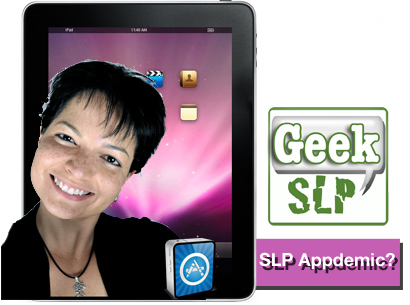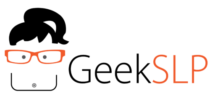
It seemed like just an ordinary day back in November of 2009, when I was playing with my iPhone and I was thunderstruck with an epiphany to create apps for speech therapists. As the iLighbulbs flashed above my head I envisioned an app that would provide therapists with the ability to select specific phonemes and have all their flashcards stored on their iPhones. For some people an idea like this can feel farfetched, but for me a self professed geek, having already designed several websites from a young age, and understanding html very well, learning what it would take to put my ideas in action was not an obstacle that I would let get in my way. With nonstop dedication, and night after night working tirelessly my first app –and the very first app for speech therapists– was born; like a proud mother, I still remember that precise joyful moment on January 2nd of 2010.

But I didn’t take five seconds for myself to breathe between January and March as I was working nonstop on creating 5 other apps (WhQuestions, Age calculator, yes/no, iTake Turns, iPractice Verbs). I was a woman on a mission. I could feel the difference these apps made in therapy rippling through my veins and I wanted to see every aspect of therapy utilize the potential of this powerful device. Despite the fact that maybe 10 to 20% of TSHA attendees that year owned an iPhone or iPod touch, it had appeared nobody had even ever considered using it for therapy! Oh, I forgot to say: all this happened before the iPad (yes, there was life before iPad).
I loved to see the reaction of my fellow SLPs when I showed them what the app could do. A lot of people instantly recognized it was a deal: 450 flashcards organized by sounds with data tracking capabilities. This would probably cost us around $200 if we buy paper flashcards (not to mention that they don’t come with data tracking capabilities). Other attendees were apprehensive at such a change, they thought it was too expensive. The reality was: most of iPhone apps I knew were less than one dollar; so I could see where they were coming from. No matter if they loved it or not, one thing was universal—their eyes bulged wide open with amazement as if they were looking at an alien, and more often than not that look of surprise turned to a smile when they saw this “alien technology” for therapy was on something they might already own—an iPhone. Today- a little over one year- that app on its original state would be considered outdated.
I believe that at that time if you searched the key word “Speech therapy” on the app store probably 80% of apps there were developed by me. 😉 – well, there were probably only 8 apps available.

Many people have difficulty separating me as a developer and as an app reviewer/educator/blogger of the tech for SLPs. While Smarty Ears is a company that is behind me in the development of apps, I still felt the need to do things independently from the company. The need to teach about other apps that I like, and to teach about implementing technology. GeekSLP & Smarty Ears are like cousins with completely different purposes. GeekSLP gives free information (it is a free app) that could benefit almost all educational technology users by giving them tips to utilize their iDevices, while Smarty Ears is pushing Speech Therapy and education forward by creating apps.
When I started blogging ad video podcasting only a couple (and I mean TWO or so) SLPs were doing it- especially with focus on technology; today we have tons of blogs that want to discuss and review apps.
Is this the “ SLP APPidemy”?
Yes, the iPad is a revolution to our field. However, would it really be a revolution without the apps or without the people who created them?
If you search the key word “Speech Therapy” on your iPad you will see that we have 55 iPad apps for SLPs. I have created 14 of them. I have created a total of 25 apps between iPhone, iPad and Android apps! Five more in the works. I am currently collaborating with my fellow SLPs from Twitter has led me to start publishing apps for other SLPs with ideas like me.
If you search the keyword: physical therapy you get only 23 apps, and only 4 when you search occupational therapy; likewise you only see 14 when you search counseling. You may ask yourself: is the iPad having the same impact on these professions?
I believe the iPad is an enormous success partly due to the nature of our work: play based learning. Also due to the fact that we have been stuck in the stone age with our materials: flashcards? worksheets? But also because the apps are available; I applaud all SLPs who have created apps for us.
Today the iPad is seen as the number one therapy box for many therapists. It is also the number one topic many speech therapy groups discuss online. I have provided trainings all over the country and been invited for at least 10 state conventions for this year (and invitations for 2012 are also getting to my mailbox) to teach people about the amazing power of technology and the apps.
It has been an amazing year for my profession and me and I see that we are moving towards a more environmentally friendly, and engaging therapy set up. It was about time! After 15 months developing apps for SLPs, giving training all over the world on the use of apps and iPad, I still always look forward making new geek friends online, presenting, and creating apps that make a difference.
GeekSLP ( AKA Barbara Fernandes, M.S; CCC-SLP)




iPad has forever changed my 37 yr career in speech therapy. I have 80 plus apps that I use for preschool sp/Lang therapy. Extremely effective, engaging, and data driven. My flashcards are gathering dust……
Hi,
I am a recent grad in NZ and I just got my ipad. Do you have any suggestions of good apps to get and/or any links to good articles on AAC and/or speech therapy and the iPad? I am looking at how new technology and the ipad has an impact on AAC for children/adults with communication disorders as a masters over the next two years. Any information would be awesome.
Thanks
Leanne
🙂
Can you share some of your favorites? I just got an iPad. I work with preschool population and am thrilled with the language I can elicit using the iPad.
Judy
Please share the apps you use. I am a speech path, I just got an ipad, and one of my assignments is a preschool!
can i please know the names of these apps to which you refer?
i work with that population. thanks!!!!!!!!!!!!
I have just purchased an iPad2 and work exclusively with preschoolers–do you have a list of your apps or apps you would recommend for this population? As I am sure you experience, my students range from non-verbal severely cognitively impaired to verbal children with pragmatic disorders. I would appreciate any input you have!!
Jillian,
Here is a document I created with apps:
http://www.scribd.com/doc/49125628/iPad-iPhone-iPod-Android-Apps-for-Speech-Therapists
Have fun!
GeekSLP
Beautiful post. I’m storing it away too as this is a day I keep preparing for in my mind but know, I’ll never be fully prepared. It will just have to come from the heart. Now I need to go find a tissue to wipe my eyes.
I don’t have WIFI in my building. Am I able to download apps at a wifi hotspot and then still run the apps at school? If it is app specific, then is there a way to tell when reading the specs about a particular app?
I am having a hard time opening up the 17 page summary document. Is there anyway you coould send it to me? I am trying to get my hospital to purchase an iPad for the SL:P’s and I’m sure that document would help immensely
Hello,
I’ve been an SLP for more than twenty years, and have used technology for most of that time for projects, animations, and integrated multimedia games and exercises to serve my students in novel ways. I’ve an IPAD2 and would like to create applications with object-oriented software–if there is any available–for that device. (There appears to be a lot of consistency in the “format” and object-devices used in Apps–e.g., score or tally wheels, spaces to list students, buttons to push.) So I wonder–and I’ve written to you once before–if there’s any object-oriented software “out there” so I can customize–from start to finish–not ONLY change stimuli as some programs allow–but build the whole application from the ground up with my own pictures, timing devices, etc. I don’t want to write a lot of code; I’d rather shift pre-programmed “objects” around, integrate them and make them work synergistically. I’d love to hear any suggestions. (You might write directly to my email: yalegould@gmail.com).
Many thanks for the applications you’ve created. All best, Yale
Are there any apps for the adult aphasia and brain injury populations for language and cognitive therapy?
Hi
I am a speech and language therapist in the UK and am hoping to create specialist SLT/SLP apps. My first one is a phonology/artic app for pre-schoolers called “Bigmouth Sounds”.
I love for you to take a look!
Norma